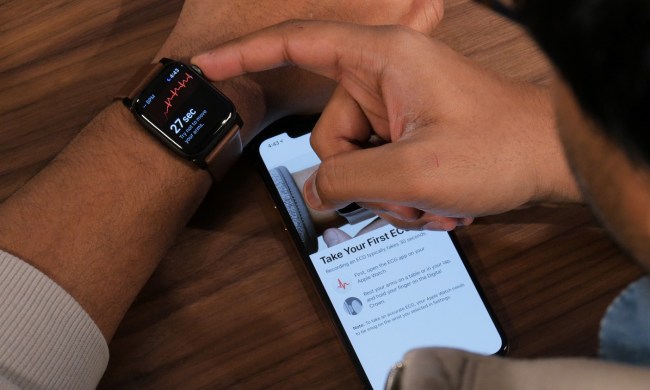When you think about wearable tech, chances are that your mind goes to a device like the Apple Watch long before it does the Band-Aid-style smart patch developed by Epicore Biosystems. But the company, which spun out of Northwestern University’s Querrey Simpson Institute for Bioelectronics and professor John A. Rogers’ laboratory, has been hard at work creating sweat-sensing smart patches which could be used to help measure sweat components in athletes and a variety of other individuals — and could even have potential application for medical use in helping keep tabs on crucial biomarkers for patients suffering from COVID-19.
“We have [created] two versions of the wearable sensor patch in development suitable across different applications,” Roozbeh Ghaffari, Epicore’s CEO and co-founder, told Digital Trends. “One is a color-changing wearable microfluidics patch used by athletes. The other is a Bluetooth-enabled patch that tracks the sweat biomarkers of workers in construction, on oil rigs, and in factories, plus other physically intense occupations — for the ‘industrial athletes.'”
The first of these patches, the Gx sweat patch, was developed by Epicore in partnership with Gatorade. It’s been in beta testing since the first part of 2020, and Gatorade reportedly hopes to be able to release it to customers in the second part of the year. The Gatorade patch can measure the rate of sweating, along with sodium chloride concentration.

However, other versions of the patch technology are in development — complete with built-in batteries and various components for on-device analysis, which could keep tabs on levels of biomarkers such as lactate, glucose, cortisol and more. The idea is that these could help determine valuable information about wearers’ physiology, dehydration, and stress levels. This information could then be analyzed by a paired mobile app for suggesting changes in diet, stress, or hydration.
As mentioned, the technology may have medical usage, too. “We are in the early stages of applying our patch technology to help with the current coronavirus pandemic,” Ghaffari said. “Partnerships with companies like Leo Pharma and Gatorade have helped us build out sweat-sensing patches for tracking electrolytes and other less explored biomarkers like cortisol and cytokines that correspond to the body’s stress and immune response. We’re working closely with clinical collaborators to apply these sensor patches to characterize sweat electrolytes and cytokine levels.”
Whether these tools are ready in time to play a valuable role in the current coronavirus pandemic remains to be seen. But, as the Apple Watch’s heart rate-reading tech has already shown, wearables can have a profoundly important part to play in keeping track of our body’s ability to function. If Epicore has its way, it won’t be long before users have another wearable at their disposal for additional tracking.


